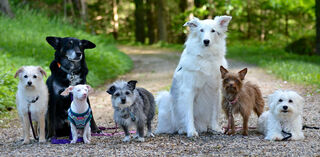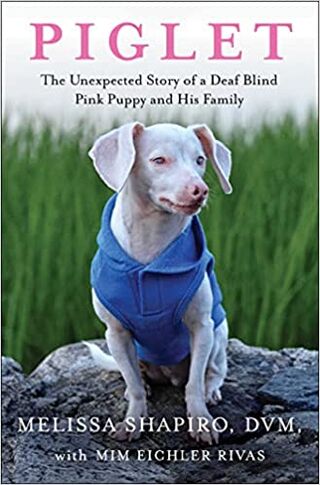Relationships
Piglet, a Deaf and Blind Puppy, Teaches the Power of Love
A pup named Piglet teaches resilience and changes lives without sound or sight.
Posted August 3, 2021 Reviewed by Chloe Williams
Before I read Dr. Melissa Shapiro's riveting new book called Piglet: The Unexpected Story of a Deaf, Blind, Pink Puppy and His Family, I had heard about it from a few people and thought that no book could possibly be as inspirational and important as they told me it was.1,2 However, I was wrong and pleasantly surprised that Shapiro's riveting Cinderella story of a tiny deaf blind pink pup called Piglet, who surely would have died had not human hands and hearts intervened, took me on an unexpected and bumpy joyride laden with concern and also embracing kindness, compassion, and love when the easy way out would have been to say something like, "This is hopeless."
Shapiro and her family and friends saw the light and now we can all benefit from their selfless efforts to give Piglet an amazing life with humans and other dogs without sound or sight.

I'm thrilled Shapiro could take the time to answer a few questions about her landmark book. Here's what she had to say about her life-changing experiences with Piglet.
Marc Bekoff: Why did you write Piglet?
Melissa Shapiro: Over the past four years, Piglet has grown from a tiny screaming anxious deaf blind pink puppy into an inspiring, motivational ambassador, setting an example of resilience, empathy, and kindness for people of all ages. His social media following continues to grow, and his Piglet Mindset educational outreach program reaches thousands of children each year.

I feel extremely fortunate to have been given the opportunity to be part of Piglet’s story, and now, to write a book about his, and our, journey. It was a much more challenging project than I expected, but Piglet is a heartwarming story that will bring Piglet’s message of positivity to a wide-ranging audience of adults and children all around the world. That was and is our goal.
MB: How does your book relate to your background and general areas of interest?
MS: Becoming a veterinarian was my primary focus from the time I was 6 years old until I was accepted into vet school during my junior year in college. Until then, everything I did revolved around animals and my goal of getting into vet school.
While the main storyline in the book is fostering, adopting, and caring for a deaf blind dog, the book is also about my life as a veterinarian, wife, parent, and animal rescuer, which all led me to my initial encounter with the tiny pink baby dog.
MB: Who is your intended audience?
MS: Piglet is a book for everyone. It is a positive feel-good story that teen and adult readers coming from a wide range of backgrounds will enjoy, identify with, and even learn from. It is for animal lovers and rescuers, dog people, educators, parents, and students.
MB: What are some of the topics you weave into your book and what are some of your major messages?
MS: Piglet is a book based on Piglet’s heartwarming story of survival, facing challenges with a positive attitude, and becoming an inspirational role model for children and adults around the world through his social media pages and Piglet Mindset educational program. Bringing Piglet into our lives created an unexpected twist in our master plan, hence the subtitle, the unexpected story. We all had to accept and embrace him and our decision to make him a permanent member of our family. Accepting the unexpected is a major theme that weaves its way through the course of the book.
Of course, my husband who we refer to as Piglet’s Favorite Dad has a big role in the book, as do my three children, all of whom have been swept up in this most unexpected, and sometimes ridiculous life change that I couldn’t have thought up in my wildest dreams. As it turns out, as crazy as they thought we were, all three of our kids have bought into the positive aspects of adopting Piglet and bringing the Power of Pink to children and adults all around the world.
We tried to create an enjoyable, educational, thought-provoking book that incorporates topics and messages that include growth mindset, animal rescue, animal welfare, veterinary medicine, dog training, compassion for all, parenting, setting goals, and setting an example of acceptance and inclusion, empathy, and kindness.
Readers will absolutely find themselves smiling, and maybe shedding some tears, and hopefully they will take something away to help make their own lives a little bit better!
MB: How does your book differ from others that are concerned with some of the same general topics?
MS: Piglet is not a straightforward animal rescue story. It is not just a veterinary medicine story, not just a dog story, not just a story about disabilities, and not just a story about family and friends. Actually, it is all of these things, woven through the story of a tiny deaf blind pink puppy who wasn’t meant to survive let alone live a happy, meaningful, productive life. The book is about family and friends, empathy and kindness, and accepting the unexpected, all wrapped around the amazing resilience and mindset of the tiny sweet little Piglet, the deaf blind pink puppy.
MB: Are you hopeful that things will change for the better as people learn to connect with dogs (and other nonhumans) based on some of what you've written?
MS: Yes! Piglet’s message is universal and engages people from all walks of life. He is so compelling that people seem to find him and latch on. When they share their stories with me, I know Piglet and I are making a difference, one Piggy friend and one Piglet Mindset classroom at a time!
MB: What are some of your current projects?
MS: The main goals of our nonprofit are expanding our Piglet Mindset educational outreach in schools and collaborating with other animal and human disabilities organizations. We will continue to advocate for individuals with disabilities through social media and now the book.
MB: Is there anything else you'd like to tell readers?
MS: When I first read the e-mail letting me know about a tiny deaf blind puppy who needed a home, I was set on saying no. Even when agreeing to foster him, I was 100 percent set on finding his forever home, and that home was not going to be mine. Ultimately saying yes was very difficult and has taught me a lesson that I didn’t think applied to me at this stage in my life.
Sometimes it really is okay to step back, change direction, and your mind. It’s that old family saying, “Why say no when you can say yes?”
References
In conversation with Meliissa Shapiro.
Notes
1) Melissa Shapiro, DVM, is a veterinarian, a lifelong animal welfare advocate, and mom to three children and many disabled rescued dogs and birds. Since bringing Piglet home in 2017, she has used his social media platform to educate, advocate, and inspire others to adopt pets with special needs. Her nonprofit organization, Piglet International Inc., supports the Piglet Mindset Educational Outreach, a free downloadable educational program that teaches growth mindset, acceptance, inclusion, empathy, and kindness to students and others in the community, as well as various animal rights causes. She lives in Connecticut with her husband Warren, six rescued dogs, three rescued birds, and Piglet, the deaf blind pink puppy. You can contact Piget at pinkpigletpuppy@gmail.com.
2) Piglet, the deaf blind pink puppy was rescued from a hoarding situation in Georgia along with his mother and 3 litter mates. He is a Dachshund Chihuahua mix, and the product of two dapple colored parents. Dapple to dapple breeding results in a 25% chance of each puppy being “double dapple”. This double dapple color pattern is linked to congenital ear and eye defects that may result in partially or completely deaf/blind puppies. Piglet is deaf and blind.
Instagram: Piglet loves doing groups work with the other dogs. He receives tap signals for communication where the other dogs can hear and see verbal and hand signal cues.




